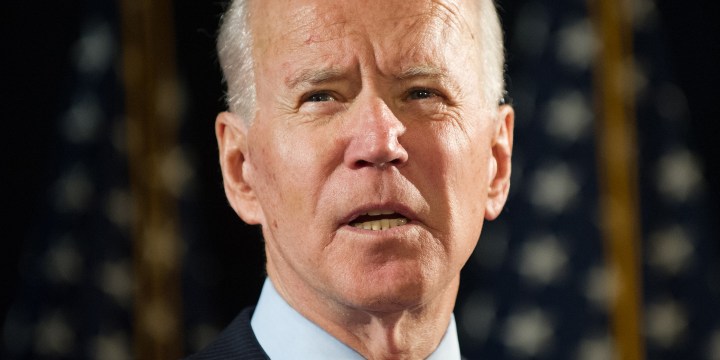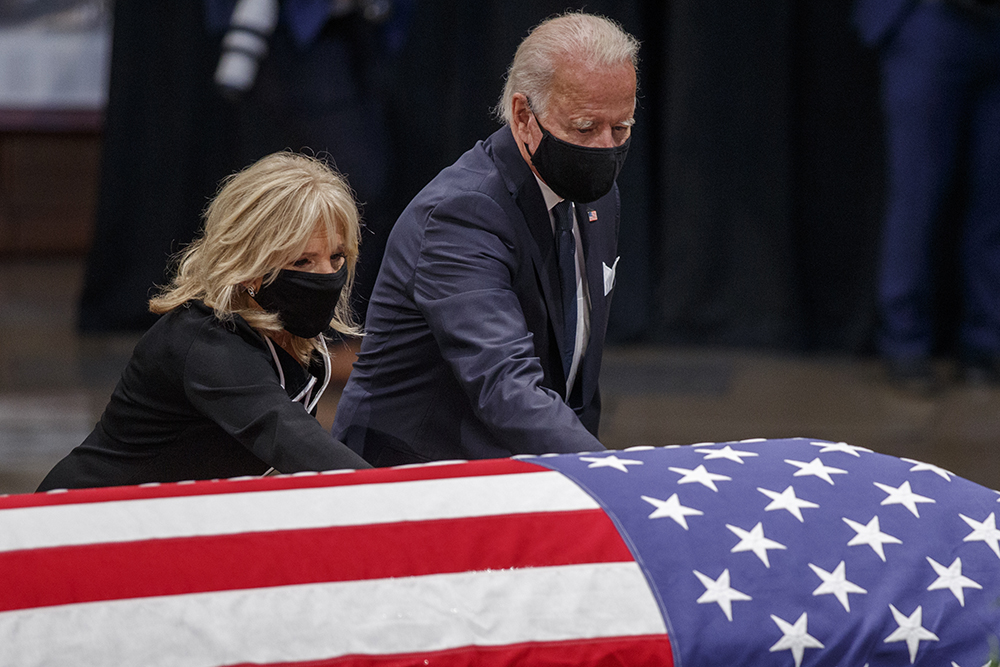2020 US PRESIDENTIAL ELECTIONS
Preparations already taking shape for Joe Biden’s world

While the nomination process has not yet occurred, let alone the November general election, not-quite-formally-nominated candidate Joe Biden’s camp is already quietly beginning to set out the groundwork for a Biden presidency, come 20 January 2021.
Between paying attention to the increasingly bizarre political shenanigans (one of Joe Biden’s longtime favourite words of derision about some awful, tawdry malarky – another Biden favourite) in the US these days and the baleful possibilities of Covid-19 infections, I have often retreated, at least temporarily when it is warm enough to sit there with a cup of coffee, to the quiet and privacy of our small garden.

The tranquil garden, for coffee and musing/pondering, when the weather allows. (Photo: J Brooks Spector)
Sitting there, I can watch a school of some 45 goldfish, as well as a horde of sparrows and weaver birds that peck at the contents of the bird feeder, and the loeries and pigeons that are too heavy to hang on to the bird feeder, but which pick at the fallen remnants. There are two increasingly elderly cats now too lazy or tired (and one which seems afflicted with a kind of mild feline dementia) to chase after the birds or the fish. There is also a family of nearly-prehistoric, predatory hadedas which come from across the street to invade this garden – usually in the vain hopes of spearing a fish before I can stop them from their opportunistic foraging. Without piling too much metaphorical weight on our little garden drama, there are obvious parallels to be drawn with what is happening in US politics right about now. Now contemplate that!
Astonishingly, at this point in a very strange election year, neither party has quite figured out how to host its usual nominating convention with its thousands of delegates, journalists, lobbyists, corporate sponsors, and political strategist hangers-on. Usually, too, there would be activists and protesters kept outside the arena, but still prime broadcast television fodder.
Instead, this time around, organisers are trying to figure out how to do virtual conventions that will still, somehow, grab viewer attention even as the events will diminish the impact of either candidate’s acceptance speech. The Biden campaign has indicated their candidate will offer his acceptance speech directly from his home in Wilmington, Delaware, while the Trump folks are trying to figure out how to drape their guy in the trappings of the White House, but without tripping over ethical and legal obstacles over using that national building for what is demonstrably going to be a partisan political moment like no other.
All of this, of course, is taking place amid the ongoing carnage of the Covid-19 pandemic, the dramatic, ongoing collapse of the economy as a result of the disordered, chaotic start-stop-start lockdowns across the 50 states, as well as the tumult that has evolved from protests about the police killings of various unarmed young black men in several cities and towns in the past months. And in the background of all of this, there grinds away the demonstrably incompetent Trump administration as it tries to sing and dance its way out of a litany of largely self-inflicted disasters – now inconveniently piled atop one another and interacting in ways no one really even wants to think about.
The two conventions are now just a couple of weeks away, with the Democrats up first in Milwaukee and the Republicans somewhere. Actually, the Democratic event will only nominally be in Milwaukee without the physical presence of the nominee or his pick for vice-presidential candidate, and the same seems true for the Trump renomination effort. And no one can say how this will play out.
Accordingly, one of the big political battles emerging from the Covid-19 chaos has been the almost inevitable massive growth of mail-in/absentee voting, due to the impacts of the pandemic on voter behaviour. (A significant number of states already conduct their voting by mail, and the president, himself, has voted by mail in the past as well, but this election will be different than any before.) Crucially, however, beyond the usual kinds of administrative headaches such a major, unanticipated, quick switch would inevitably lead to, growing confusion about this method of voting is coming from the president’s continual bad-mouthing of mail-in voting as something that is inherently fraught with vast fraud conspiracies by (shhh) Democrats. Then there is the ostrich-in-the-ground-like reluctance of many states to gear up sufficiently for this expected wave of mail-in votes; the unwillingness of the US Postal Service to staff up for this wave; and, most important of all, there is the continued foot-dragging by a Republican Senate on any effort to fund the postal service sufficiently to do this task properly.
Despite all these uncomfortable truths, and besides the fact that Joe Biden has yet to be officially nominated, let alone elected, the Biden camp is already engaged in staffing out ideas about policy directions for a new Biden administration. This is notwithstanding that the candidate is far from naming members of his Cabinet, heads of key independent agencies, or even his vice-presidential pick, although the latter is due to be announced within a week. It will be big news, no matter whom he picks, partly for the very public way speculation has been ongoing about who he will pick, but largely because of his pledge to have a female running mate.
Normally, once a candidate becomes the president-elect by virtue of the actual election, a special government appropriation for transition planning kicks in as the winning campaign pivots to preparing for an incoming administration that will, inevitably, be said of it, that it wants to hit the ground running. There is the soliciting of CVs and the receiving of many more from people who wish to be considered for all manner of positions in the new team.
Generally, there are about 3,000 positions throughout the government that can be filled by political appointees. These range from Cabinet secretaries/deputy secretaries/undersecretaries and assistant secretaries, heads of independent agencies such as the CIA, then on to ambassadorships, heads of special, prestigious boards and commissions, and then down to the tiniest of government bodies such as the US-Japan Friendship Commission board with its handful of appointed members.

Former Vice President and Democratic presidential candidate Joe Biden and Jill Biden pay their respects to US Representative from Georgia John Lewis following a memorial service in the Rotunda of the US Capitol in Washington, DC, USA, 27 July 2020. EPA-EFE/SHAWN THEW / POOL
Each appointee must be vetted both in terms of whether their views fit with the president-elect’s views about the job they seek, as well as their ability to pass through the fine-toothed comb of vetting in terms of financial and security fitness for office. There are detailed – sometimes deeply invasive – forms to complete, and then an equally intrusive security clearance process carried out by the Office of Personnel Management or FBI, depending on the position.
The incoming Trump administration in 2016/7 had actually started with a traditional, well-organised transition process, headed by former New Jersey Governor Chris Christie. But that was only true until the Trump family and several others got hold of it and some seriously inexperienced individuals ended up largely running the process. Thereafter, it became a significantly more disorderly process – including interviews with the incoming president for some senior positions that seemed to mimic the contestant elimination process of a television game show (no surprise there).
Presumed candidates could be found waiting, in full view of reporters, for the summons to meet with the victorious candidate in his eyrie at the top of Trump Tower in New York City. The end result of this disorderly process helped contribute to the chaos of the early months of the Trump administration and the subsequent churn in appointments.
This time around, should the incumbent president win, there obviously is no need for a formal transition process, although many in the administration could be planning their departure while the getting is still good and before they are driven out by presidential pique or public opprobrium. But even though the election is still months away and the inauguration still beyond that, the Biden camp has already been thinking about this.
This is true, although any kind of visible public effort in this regard would smack of some real hubris, effectively saying there was no real need to bother with an actual election since the polls have already announced the winner. Not cool. Voters tend not to like candidates who anoint themselves in the manner of Napoleon seizing the laurel wreath from the hands of the waiting pope and then crowning himself as the French emperor.
Nevertheless, chance clearly favours the prepared, especially in troublesome times like these, and so the Biden team is already engaged with task forces on key areas, but not yet on whom might be included in a new administration. In the past week, a fascinating profile of the foreign policy process in the Biden camp has appeared, identifying many of the specialists who are drafting position papers and think pieces for a new administration. There are certainly similar groups at work on domestic policies, budget/finance and taxes, and defence, among others.
Naturally, the specifics of policies will be largely determined by which individuals become the secretaries of state, defence, treasury, homeland security and energy, as well as the national security adviser. (Policy is also affected by what happens in the world and the actions, aims and objectives of other actors.) Of course, if Susan Rice is not picked as Joe Biden’s running mate (even though her availability is being pushed hard by supporters), she almost certainly will have a near-lock on secretary of state, despite incessant Republican criticism over her supposed role in the Benghazi incident and her presumed reputation as a person who takes no bureaucratic prisoners and who suffers fools not at all. Regardless, either as vice-president or secretary of state, she would certainly have much to say about the personalities that would populate her bureaucratic world, as well as the policies they would espouse. Thus, these current foreign policy task forces are a project in the making, rather than a final product.
But, what does the ongoing process have to say about a future Biden foreign policy? A very recent article in Foreign Policy magazine was trying to suss out the directions of a Biden foreign policy effort – or at least its general contours. As the authors of this piece wrote:
“Former U.S. Vice President Joe Biden’s team of informal foreign policy and national security advisors has expanded to over 2,000 people, including 20 working groups spanning issues from diversity in national security to arms control, defense, intelligence, and homeland security, according to campaign officials and an internal list of the co-chairs of those groups obtained by Foreign Policy.
“The organization of the group offers insights into how Biden would seek to mold his foreign-policy agenda and turn back some of U.S. President Donald Trump’s most controversial foreign policies, including the demonization of refugees and the curtailing of women’s sexual and reproductive rights around the world, should he win the November presidential election. It also sheds light on the coterie of behind-the-scenes advisors, such as the East Asia expert Ely Ratner and Daniel Benaim, a Middle East specialist with deep ties to Biden, who are likely to take up top and midlevel posts in the Pentagon, State Department, intelligence community, and other agencies if Biden is elected.
“Ratner and Benaim are among 49 working group co-chairs who act as gatekeepers for a broader community of foreign-policy, defense, homeland security, and national security experts who are feeding ideas, policy papers, and resumes into the Biden campaign’s maw. Officials familiar with the advisory groups say they are not an official part of the campaign but work in parallel with the campaign to provide informal advice to Biden and his key decision-makers on a volunteer basis. Most have sought to keep their activities under wraps.
“The co-chairs’ backgrounds span government, consulting, think tanks, and the defense industry, and they include former senior Obama administration officials in the State Department, Department of Defense, and Department of Homeland Security. Politico previously reported that the Biden camp had built a team of at least 1,000 national security experts working in the 20 working groups. Foreign Policy reviewed an internal document that identifies the specific names of the working groups and the chairs who lead them.
“Each of those working groups oversees multiple subgroups addressing such issues as the Israeli-Palestinian conflict, humanitarian relief, and refugees. For instance, the Defense working group, which is led by Frank Kendall III, a former undersecretary of defense for acquisition, technology, and logistics; Rosa Brooks, a former senior Pentagon advisor who previously wrote a column for Foreign Policy; and Christine Wormuth, a former undersecretary of defense for policy, oversees between 100 and 200 specialists and includes about a half a dozen subgroups focused on the budget and regional commands.
“The Europe team has over 100 people on its roster, according to several people familiar with the matter. It is co-led by three former national security officials in the Obama administration: Julie Smith, who until recently co-edited Foreign Policy’s ‘Shadow Government’ column; Michael Carpenter; and Spencer Boyer.
“The ideas and advice are then sent up to a small inner circle of Biden loyalists, including Antony Blinken, Jake Sullivan, Avril Haines, Brian McKeon, and Julie Smith, who are likely to serve as the national security brain trust for a Biden administration. What happens with that advice is a mystery to many of those who supply it, with one official saying it seems like much of the policy initiatives disappear into a black hole.
“ ‘The working groups have no real decision-making authority, but they oversee this massive machinery that is churning stuff out all the time,’ said one official who has interacted with the working groups.”
Is this some kind of “fly by the seat of one’s pants” effort or is it infused with Biden’s own half-century of experience in government? The structure of this effort is a kind of palimpsest of the standard interagency decision-making process evolving out of the National Security Council the Trump administration largely broke down, choosing instead to delegate crucial decisions to a tight circle of acolytes, loyalists, close-but-outside associates, and, inevitably, family members. (You know who.)
Still, this early version of the Biden process is already taking a bit of flak from some experienced Democratic foreign-policy experts who think this process remains opaque. Accordingly, this makes it harder to tell if the advice they are offering is actually being taken on board by the candidate and his top advisers – or if this big machine is purposefully designed to make everyone, all the branches of the party and the intellectual weight behind them – feel they are being listened to in the interests of party unity. One Washington friend of this writer noted this roster of names had a “same old, same old” feel to it. That should not be really surprising, given this candidate’s effort to come across as a kind of Barack Obama third term for a new era.
In fact, according to the Foreign Policy article, “ ‘It’s organized like a government, and it’s hierarchical and bureaucratic like a government,’ said one working group member. ‘One primary purpose is to make people feel like they are included. Another purpose is that it creates a proving ground for people who might be hoping to be considered for various jobs in a Biden administration. It’s a chance to show your work.’ ”
That anonymous adviser added, “It’s not that it isn’t genuine, but there is a tactical element of getting people on board from the progressive camp.”
Of course, it is early days yet. The nomination is not yet formally accomplished. The first speeches from Biden as the formally acknowledged candidate have yet to be given, let alone the ideas that will come out of the three scheduled presidential and one vice-presidential debates.
Regardless, foreign diplomats, journalists, analysts (at least those not already being put to work by the Biden camp) and Biden’s opponent’s campaign handlers are undoubtedly already doing deep research on the most likely ideas coming from that list of advisers, now that Foreign Policy, among others, are making the names known. We shall too. DM
















 Become an Insider
Become an Insider